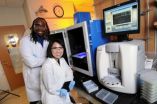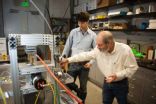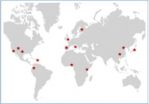(Press-News.org) Fairfax, Va. -- A malarial drug is showing promise in stopping breast cancer before it starts, Mason researchers are discovering during a clinical trial.
"The bold long-term goal is a short-term oral treatment that prevents breast cancer by killing the precursor cells that initiate breast cancer," says Lance Liotta, co-director of Mason's Center for Applied Proteomics and Molecular Medicine (CAPMM). "And it's looking hopeful."
The PINC trial (Preventing Invasive Neoplasia with Chloroquine) targets ductal carcinoma in situ, or DCIS, the most common type of pre-invasive breast cancer. Chloroquine is a drug given to prevent or treat malaria; it's showing promise in the early phase of the PINC trial.
CAPMM has three ongoing breast cancer research projects, including the PINC trial, which span the full scope of breast cancer's impact on patients.
In the PINC trial, DCIS is the focus. DCIS shows up as white spots in the MRI of a breast. Those white spots are calcifications that may mark the milk ducts where DCIS cells are growing, says Virginia Espina, assistant research professor at CAPMM. Not all DCIS becomes cancer, but all breast cancer goes through the DCIS stage, she says.
If the patient is diagnosed with DCIS after a biopsy, then she can enter the trial, says Espina, adding that the study doesn't interfere with standard medical treatment. Mason researchers are working with Kirsten Edmiston, a surgeon at Inova Fairfax Hospital who recruits the patients and clinically directs the trial.
While patients are waiting between their diagnosis and the surgery, they take chloroquine once a week for four weeks, Espina says.
A significant reduction in the lesion's size is the sought-after outcome, Espina says. The widely prescribed malaria drug chloroquine has few side effects — a rare rash is one, Espina says. There could come a day when chloroquine is taken by women worldwide to prevent breast cancer.
"We can imagine that in the future every woman will take chloroquine once a year," Espina says. "Chloroquine kills off the pre-malignant cells that are starting to accumulate. You'd do this periodically as a new type of chemo prevention."
Chloroquine works by stopping autophagy, which is used by cells to survive under stress. "When your cells realize they don't have enough nutrients, they eat themselves," Espina says. "It's a way to make energy when you don't have enough food."
And that's the spot the DCIS cells are in as they pile up in the milk duct. They're not getting enough oxygen and food and are squashed together.
"For all these reasons, they're under stress," Espina says. "When a cell is under stress, it's a life-and-death struggle. They're not just going to die. They're going to do what they can to survive. That's when they use autophagy to stay alive."
Chemotherapy, a common treatment for cancer, can rev up autophagy, Espina says. "A doctor selects a treatment to try to kill the cell, but the cell is trying to survive; it's trying to do what it's programmed to do. We have to find a way to defeat this cellular process."
Chloroquine works like Pepto-Bismol; it alters the cell's digestive process and therefore autophagy. "But the chloroquine doesn't kill the normal cells because the normal cells aren't dependent on autophagy to survive," Espina says.
The second CAPMM study on breast cancer is funded by the Side-Out Foundation. Researchers are developing individualized treatment for women with metastatic breast cancer. These advanced tumors have spread to other organs, such as the liver, brain and bone, and have limited response to conventional therapies. Standard chemotherapy failed the 25 women Mason has worked with to pinpoint more effective treatments, says Mariaelena Pierobon, CAPMM assistant research professor.
Pierobon is using technology created by Liotta and Emanuel "Chip" Petricoin III to identify which drug targets are activated within each patient tumor. Pierobon's team is building on the promise of personalized medicine by focusing on the molecular profile of the metastatic lesions.
"We hope that by providing physicians with detailed information on the mechanisms that are driving our patients' tumors, we can facilitate the selection of the most appropriate treatment," Pierobon says. "We are trying to guide that decision by using the cutting-edge molecular technologies that were created in our laboratory to select among the FDA-approved drugs that might be the most promising for each patient."
In this approach, patients don't have to wait for new drugs to be developed. "By using drugs that are already approved, you don't have to study toxicity. That's a huge advantage," Pierobon says.
The third study is the I-SPY 2 TRIAL in which CAPMM researcher Julia Wulfkuhle is leading molecular profiling efforts developed uniquely in the Mason laboratory for women with stage II/III breast cancer. The FDA singled out I-SPY 2 as a leading trial design for accelerated drug approval.
The Side-Out Foundation raised $370,000 through volleyball tournaments to fund the metastatic breast cancer trial. The Side-Out Foundation is sponsoring the ongoing CAPMM research studies on the I-SPY 2 TRIAL through the FNIH Foundation for the National Institutes of Health. The Department of Defense Breast Cancer Research Project is funding the majority of the $2.1 million, three-year PINC grant, which started two years ago.
###
About George Mason University
George Mason University is an innovative, entrepreneurial institution with global distinction in a range of academic fields. Located in Northern Virginia near Washington, D.C., Mason provides students access to diverse cultural experiences and the most sought-after internships and employers in the country. Mason offers strong undergraduate and graduate degree programs in engineering and information technology, organizational psychology, health care and visual and performing arts. With Mason professors conducting groundbreaking research in areas such as climate change, public policy and the biosciences, George Mason University is a leading example of the modern, public university. George Mason University—Where Innovation Is Tradition.
George Mason University researchers target breast cancer in 3 trials
A malarial drug is showing promise in stopping breast cancer before it starts
2012-11-01
ELSE PRESS RELEASES FROM THIS DATE:
Researchers use blood testing to predict level of enzymes that facilitate disease progression
2012-11-01
Predicting how atherosclerosis, osteoporosis or cancer will progress or respond to drugs in individual patients is difficult. In a new study, researchers took another step toward that goal by developing a technique able to predict from a blood sample the amount of cathepsins—protein-degrading enzymes known to accelerate these diseases—a specific person would produce.
This patient-specific information may be helpful in developing personalized approaches to treat these tissue-destructive diseases.
"We measured significant variability in the amount of cathepsins produced ...
Mice with 'humanized' livers improve early drug testing, Stanford scientists show
2012-11-01
STANFORD, Calif. — Stanford University School of Medicine scientists have used bioengineered mice with livers composed largely of human cells to characterize a drug about to enter early-stage clinical development for combating hepatitis C.
Tests using the new mouse model accurately predicted significant aspects of the drug's behavior in humans — including its interaction with another drug and the profile of its major breakdown products in the body (called metabolites) — far more accurately than would have been achieved using current methods.
The study will be published ...
Regional analysis masks substantial local variation in health care spending
2012-11-01
PITTSBURGH, Oct. 31, 2012 – Reforming Medicare payments based on large geographic regions may be too bluntly targeted to promote the best use of health care resources, a new analysis from the University of Pittsburgh Graduate School of Public Health suggests. The analysis will be published in the Nov. 1 issue of the New England Journal of Medicine.
"Much policy attention has been drawn to the large geographic variation in health care spending across regions, and for good reason – because regional variation points to inefficient use of resources," said lead author Yuting ...
Tabletop fault model reveals why some quakes result in faster shaking
2012-11-01
Berkeley — The more time it takes for an earthquake fault to heal, the faster the shake it will produce when it finally ruptures, according to a new study by engineers at the University of California, Berkeley, who conducted their work using a tabletop model of a quake fault.
"The high frequency waves of an earthquake — the kind that produces the rapid jolts — are not well understood because they are more difficult to measure and more difficult to model," said study lead author Gregory McLaskey, a former UC Berkeley Ph.D. student in civil and environmental engineering. ...
Unexpected factor contributes to melanoma risk in red-haired, fair-skinned individuals
2012-11-01
The well-established elevated risk of melanoma among people with red hair and fair skin may be caused by more than just a lack of natural protection against ultraviolet (UV) radiation. In an article receiving Advance Online Publication in Nature, Massachusetts General Hospital (MGH) Cutaneous Biology Research Center (CBRC)and Cancer Center researchers report finding that the type of skin pigment predominantly found in red-haired, fair-skinned individuals may itself contribute to the development of melanoma.
"We've known for a long time that people with red hair and ...
Pond skating insects reveal water-walking secrets
2012-11-01
This month's special issue of Physics World is devoted to animal physics, and includes science writer Stephen Ornes explanation of how pond skaters effortlessly skip across water leaving nothing but a small ripple in their wake.
As Ornes writes, our current understanding of the mechanisms adopted by the pond skater is down to the efforts of David Hu, who as a mathematics graduate from the Massachusetts Institute of Technology spent four years studying their behaviour.
Hu, along with his PhD supervisor John Bush, found that pond skaters use the middle of their three ...
Sleep duration affects hunger differently in men and women
2012-11-01
A new study suggests that increasing the amount of sleep that adults get could lead to reduced food intake, but the hormonal process differs between men and women.
"Restricting sleep in healthy, normal weight participants has limited effects on metabolic risk factors and may affect food intake regulating hormones differently in men and women," said Marie-Pierre St-Onge, PhD, FAHA, the study's principal investigator. "We were surprised by the lack of a significant effect of sleep on glucose and insulin, leptin, and sex differences in the hunger-stimulating hormone ghrelin ...
Scientific team sequences 1,092 human genomes to determine standard range of human genetic variation
2012-11-01
Completing the second phase of the 1000 Genomes Project, a multinational team of scientists reports that they have sampled a total of 1092 individuals from 14 different populations and sequenced their full genomes. The researchers described the feat as a collegial effort to equip biologists and physicians with information that can be used to understand the normal range of human genetic variants so that a patient's disease genome can be interpreted in a broader context.
A report on the research, published online in Nature on Nov. 1 represents the culmination of five years ...
1,000 Genomes Project paints detailed picture of human variation
2012-11-01
HOUSTON -- (Nov. 1, 2012) – First, there was the single human reference genome completed in 2003. Then there was the HapMap project to identify the common genetic variants occurring in human beings with the first map published in 2005. Now an international consortium has released the first phase of the 1,000 Genomes Project that profiles the rare and common genetic variations in 1,092 people drawn from 14 human populations from Europe, Africa, East Asia and the Americas.
The next phase of the project will include as many as 3,000 individuals, said Dr. Fuli Yu (www.bcm.edu/genetics/index.cfm?pmid=23673
), ...
New genetic links for inflammatory bowel disease uncovered
2012-11-01
Crohn's disease (CD) and ulcerative colitis (UC) – inflammatory diseases of the gastrointestinal tract – have puzzled the scientific community for decades. Ten years ago, researchers recognized that both genes and the environment contributed to these diseases but knew little about precisely how and why illness occurred. To begin to narrow in on the key pathways involved, they would need thousands of patients' samples, millions of data points, and the commitment of physicians and scientists at dozens of institutions.
Today, researchers from across the CD and UC communities ...
LAST 30 PRESS RELEASES:
High-risk pregnancy specialists present research on AI models that could predict pregnancy complications
Academic pressure linked to increased risk of depression risk in teens
Beyond the Fitbit: Why your next health tracker might be a button on your shirt
UCSB scientists bottle the sun with liquid battery
Lung cancer drug offers a surprising new treatment against ovarian cancer
When consent meets reality: How young men navigate intimacy
Siemens Healthineers and Mayo Clinic expand strategic collaboration to enhance patient care through advanced technology
Physicists develop new protocol for building photonic graph states
OHSU-led research initiative examines supervised psilocybin
New review identifies pathways for managing PFAS waste in semiconductor manufacturing
New research finds state-level abortion restrictions associated with increased maternal deaths
New study assesses potential dust control options for Great Salt Lake
Science policy education should start on campus
Look again! Those wrinkly rocks may actually be a fossilized microbial community
Exposure to intense wildfire smoke during pregnancy may be linked to increased likelihood of autism
Children with Crohn’s have distinct gut bacteria from kids with other digestive disorders
Genomics offers a faster path to restoring the American chestnut
Caught in the act: Astronomers watch a vanishing star turn into a black hole
Why elephant trunk whiskers are so good at sensing touch
A disappearing star quietly formed a black hole in the Andromeda Galaxy
Yangtze River fishing ban halts 70 years of freshwater biodiversity decline
Genomic-informed breeding approaches could accelerate American chestnut restoration
How plants control fleshy and woody tissue growth
Scientists capture the clearest view yet of a star collapsing into a black hole
New insights into a hidden process that protects cells from harmful mutations
Yangtze River fishing ban halts seven decades of biodiversity decline
Researchers visualize the dynamics of myelin swellings
Cheops discovers late bloomer from another era
Climate policy support is linked to emotions - study
New method could reveal hidden supermassive black hole binaries
[Press-News.org] George Mason University researchers target breast cancer in 3 trialsA malarial drug is showing promise in stopping breast cancer before it starts


